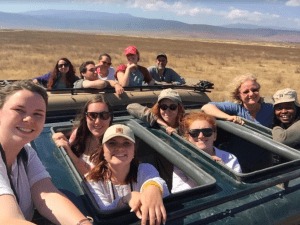Derek Taber Contributing Writer
Nine students are set to embark on a journey to the nation of Tanzania in East Africa where they will learn the impacts of tourism on the local communities. Eco tourism is a form of travel that involves visiting areas of pristine countries, with the intention of conserving the environment, and minimizing the footprint of conventional travel.
Professors Linda Beck and Mark Pires are the two instructors leading the excursion in Jan. 2020. Together Beck and Pires are taking the students to Tanzania for thirteen days to ingratiate them with a set of principles that will help them understand the philosophies of ecotourism.
Learning the impact on the local economy while traveling is the main philosophy that Beck hopes to instill. “In the context of Tanzania, I want to help the students understand the tourists’ roll as consumers with the sustainability of our purchases,” said Beck. “One has to be really careful of how they spend their tourist dollars.”
Large tourist corporations will move into an area and exploit the local communities, adding pressure to the already limited supply of resources. Most tourism companies are owned by foreign investors and keep the profits in foreign markets. Companies will add infrastructure, and put a drain on environmental ecosystems by building roads, and supply lines to keep the tourist well stocked.
“People will go off-road on safari creating a havoc to the flora and fauna, but also amongst the animals,” said Beck. The money is kept in the deep pockets of the companies and does not get redistributed. “You want to make sure the dollars you spend actually go to the local economy,” said Beck.
Thomson Safari, a tour company based in Massachusetts that leads Tanzanian safaris, had a lawsuit filed against them in 2010 by the local communities after the denizens were forced from their land and blocked from a vital water supply. Thomson was building luxury safari camps.
“The exploitation of the environment, and the people is widespread,” said Beck.
Another goal on this winter trip is to meet with local environmentalist, and observe the local ecotourism operations. The group hopes to actually engage in ecotourism as well. Beck said, “When we hike Kilimanjaro, when we go on safari, when we visit coffee farms, all of those activities will be done in a sustainable manner.”
Nelson Peterson is a student who is going on the trip to Tanzania in December. Peterson has never been to Africa before and hopes to learn what ecotourism can do for communities around the world. “It will be nice to see how other people live in a different country,” said Peterson, who is excited to help with the Porters Association.
Helping bring water to dryer areas, and lug buckets over long paths to remote villages throughout the Serengeti is a special opportunity to him. “It will be really important to help the porters, part of our trip will be to help them [Porters association] bring water to places,” said Peterson.
The impact of learning the importance of environmentally responsible behavior while traveling is the most valuable takeaway from the journey to East Africa for Beck. “Watching the students get excited about Tanzania,” she said, “[and] learning how to become a global citizen,” is something that one can take with them forever.
